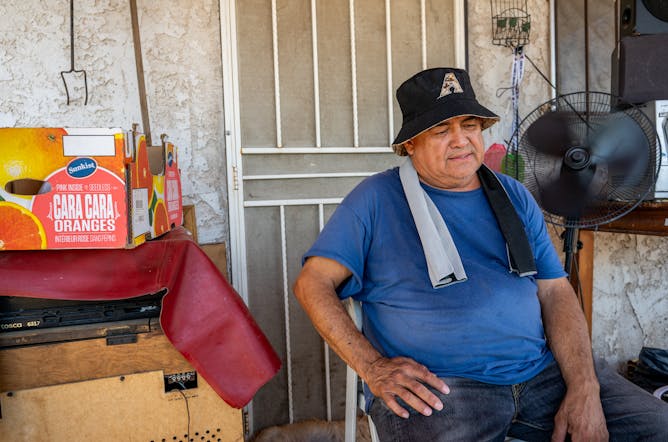|
Top headlines
Lead story
The U.S. weather map is starting to look like one giant heat alert: A bright red stripe of temperatures in the 100s covers most of the Great Plains. Humid heat is headed for the Mississippi Valley and the Northeast. The Southwest is still sizzling. Top that off with wildfire smoke, and it’s going to be one rough week for anyone with health problems.
When the air gets this hot, older adults, in particular, struggle. Boston University Professors Deborah Carr and Ian Sue Wing, along with researcher Giacomo Falchetta, explain the risks to watch for – from medications that can make people more sensitive to heat to worsened cognition in people with dementia.
[ Science from the scientists themselves. Sign up for our weekly science email newsletter. ]
|

Without home cooling, Phoenix’s weeks with temperatures over 110 F in July 2023 became dangerous.
Brandon Bell/Getty Images
Deborah Carr, Boston University; Giacomo Falchetta, International Institute for Applied Systems Analysis (IIASA); Ian Sue Wing, Boston University
Health and climate change researchers explain the risks and why older adults, even those in northern states, need to pay attention.
|
Economy + Business
|
-
Jason Miller, Michigan State University
The strike would have been the first for the parcel delivery giant since 1997.
|
|
Ethics + Religion
|
-
Helen A. Berger, Brandeis University
Practitioners of Pagan religions no longer need to go into a forest to find an object for their altars. Commercialization has meant that sacred objects are available online.
|
|
Politics + Society
|
-
Henry L. Chambers Jr., University of Richmond
Two Supreme Court rulings on the use of race appear at odds with each other. Blame Chief Justice Roberts’s ambivalence on race, a constitutional law scholar writes.
-
Brooks D. Simpson, Arizona State University
Republican Sen. Tommy Tuberville of Alabama is using a long-standing Senate practice to block military promotions.
|
|
Education
|
-
Louis-Philippe Beland, Carleton University; Arnold Lewis Glass, Rutgers University; Daniel G. Krutka, University of North Texas; Sarah Rose, Staffordshire University
The 2023 Global Education Monitoring Report proposed restrictions on the use of technology in the classroom.
|
|
Health + Medicine
|
-
Marc Cohen, UMass Boston; Jane Tavares, UMass Boston
Increasing the number of older people with both Medicaid and Medicare would mean fewer of them would be forced to skimp on the care and treatment they need.
|
|
Environment + Energy
|
-
Chris McCahill, University of Wisconsin-Madison
US cities are starting to reform laws that required developers to provide minimum amounts of parking. But there’s more they can do to loosen the auto’s grip on downtowns.
-
Kira Barrett, The Conversation
How much does human behavior influence climate change? Can it be changed, and how? In June, climate change experts and behavioral scientists came together to answer these important questions.
|
|
Science + Technology
|
-
Joel Richter, UMass Chan Medical School; Sneha Shah, UMass Chan Medical School
Fragile X syndrome is the most common inherited form of intellectual disability. Using short bits of DNA to fix improperly transcribed genes may one day be a potential treatment option.
-
Anne-Katherine Burns, University of California, Irvine
The way particles interacted while the universe was forming seconds after the Big Bang could explain why the universe exists the way it does – a physicist explains matter-antimatter asymmetry.
|
|